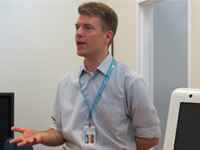
Up close and personal with Dr. Frank Rudzciz
I’ve loved robots for as long as I can remember. When I watched Star Wars as a kid, I didn’t want to be Luke Skywalker or Han Solo – I wanted to be the guy who built R2-D2. So I am thrilled that today that what was once science fiction is becoming reality. Google is building cars that can drive themselves, and the best chess and Jeopardy! players in the world are computers from IBM.
I’m especially enthusiastic about the potential for using robots and artificial intelligence in healthcare. I really started seeing that potential when I was doing my PhD in computer science at the University of Toronto, when I started working with speech pathologists, rehab scientists, and research participants. These people really opened my eyes to what it means to live with speech problems, from cerebral palsy to the linguistic aspects of dementia.
Fully 10 per cent of the population has a speech disorder of some kind, of varying levels of severity. That’s not fair, and I believe that we can use artificial intelligence to help. I want to improve the independence of people, to let them express themselves without having to talk through an intermediary.
My group has made some wonderful progress recently – some of our software can analyze a person’s voice to diagnose Parkinson’s disease, for instance, often more accurately than human experts.
This is just the beginning. My goal is to create an artificial conversational partner that is entirely devoted to effective communication focused on an individual’s specific needs. This is perhaps most important for people with Alzheimer’s disease and dementia.
In the way that a cane is a simple technology that helps us to stand, I believe our system can be a technology that helps us to understand.
Quality of life researchers like Frank need your support. Please donate.
Learn more about other researchers our donors support.
 Dr. Frank Rudzciz, Toronto Rehabilitation Institute
Dr. Frank Rudzciz, Toronto Rehabilitation Institute
Alzheimer Society Research Program grant recipient